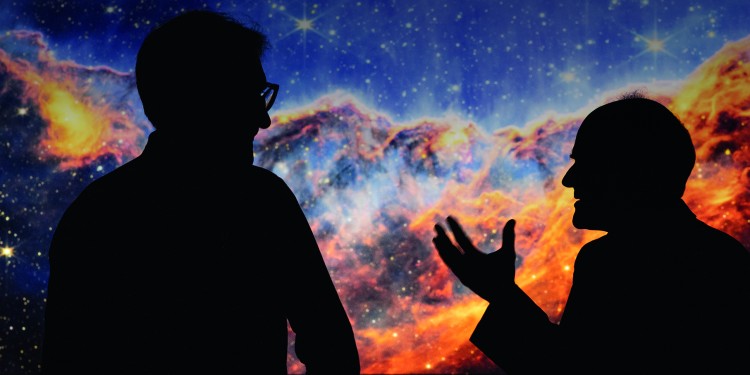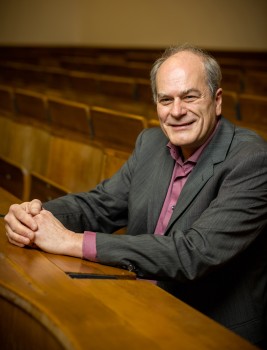
“We shouldn’t define the Big Bang as a clear border”
Science Year 2023 is devoting itself to the subject of “Our Universe”. For this reason, Christina Hoppenbrock and André Bednarz interviewed Dr. Ulrich Krohs, Professor of Philosophy specialising in the Philosophy of Science and Natural Philosophy, and Dr. Kai Schmitz, Assistant Professor of Particle Cosmology at the Institute of Theoretical Physics, who talked about why the cosmos fascinates them and what findings science has come up with.
What makes the universe so fascinating?
Ulrich Krohs: Part of it, for me, is that we see an order which at first we do not understand and which seems sublime to us. This order has been observed ever since antiquity: the ancient Greek word ‘cosmos’ means ‘ornament’ or ‘order’.
Kai Schmitz: Looking up at the night sky as a young boy triggered my fascination with it. The universe is the world stage for all the processes we know about. These include not only cosmological processes, but also those here on Earth. As a result, the beauty of the universe is displayed not only far away in space, but also very close to us.

Schmitz: I imagine the enormous structure of the universe, the so-called cosmic web. At the same time, I think of our place in the universe as an address: Schloss, Schlossplatz 2, Münster, Germany, Europe, Earth, Solar System, Milky Way, the Local Group of the Virgo Supercluster, the Laniakea Supercluster.
Krohs: The first thing I think of is the stars in the night sky, and then the Big Bang which produced the universe – as a symbol of the theoretical penetration which you, Herr Schmitz, undertake in your discipline. And finally I think of the finite, but barely comprehensible, expanse of the universe.
Schmitz: I have another answer: I imagine the universe as an onion.
As an onion?
Schmitz: Yes, the inner scales are the youngest, because looking out into the universe corresponds at the same time to looking back into the past. We can’t look out into the universe as far as we would like to because the speed of light is finite and our universe has a finite age. We can look as far as a horizon – as far as the outermost scale, where we see the universe in its earliest state.
Why should people want to busy themselves with the universe?
Krohs: In order to gain a better understanding of all the phenomena which surround us. For many people, it’s an inner need.
Schmitz: Understanding the universe means understanding the Earth. It’s all about our origins and the origins of all things. Modern science, for example, has shown us that all life on Earth consists of stardust – of chemical elements catapulted out of dying stars.
Krohs: That doesn’t mean, though, that we are stardust. We consist of the atoms originating in the stardust. But several billions of years of evolution were necessary before they were assembled in a very complex way.

Krohs: Something that was long-awaited was the direct measurement of gravitational waves in 2015. That was an important confirmation of the ideas which Einstein formulated in his General Theory of Relativity 100 years ago. More recently, there was also the launching of the James Webb Space Telescope, which we can use to look far back into the past. Staying with my metaphor: we can look as far back as the outer scales of the onion which we believe surround our own “address”.
Schmitz: I too find the gravitational waves fascinating. Their discovery shows how much preliminary theoretical work in the early 20th century, as well as international collaboration over the past decades, was necessary to achieve this breakthrough. Something else I think is exciting is the discovery in 1998 of the accelerated expansion of the universe. The dark energy postulated in theory as probably being responsible for this observation is still a mystery.
Do the scientific findings made so far have a solid foundation?
Schmitz: Cosmology is nowadays seen as a precise science. Looking at the standard model of cosmology shows us, however, that there are components which we do not know or understand exactly – dark energy and dark matter, for example.
Krohs: 95 percent of the universe is reckoned to consist of that. I think it’s very bold to hope that the explanation for the five percent which our theories cover well will not be adversely affected by the other 95 percent. It’s possible that one day we will experience a distinct change of perspective as regards our insights into the universe.
What discoveries do you hope to see in the future?
Schmitz: It’ll be fascinating to see what happens in the field of gravitational waves, By tapping into new frequencies by means of gravitational wave experiments here on Earth and in space, a whole new window will be opened up for observing the cosmos. We can now not only look into the universe, but also listen to it.
Krohs: To my way of thinking, there can be two different types of discovery: those which help to refine our current picture, and those which make a contribution to revising it. What I think is particularly exciting are the discoveries enabling us to make such revisions.
Schmitz: I agree. Perhaps one day, looking back, we’ll be able to say that it was precisely in this decade, the 2020s, that there was an increasing number of signs pointing to a complete revision. I’m thinking of the measurement of the expansion rate. There are signs of very slight cracks in the standard model of cosmology because some observations – for example, the distribution of galaxies – are not compatible with the model which we currently have.
How do you treat phenomena which have not so far been susceptible to research, for example the question of what was there before the Big Bang?
Krohs: These unexplained phenomena make me question whether there is a fundamental limit to what we can discover. If time is understood as the movement of matter, then time cannot have existed before the Big Bang because nothing was in motion. We can hardly grasp such a notion. Nor does it help to shift the answer into the realm of the transcendental. Citing a God of creation is insufficient as an explanation because that is a hypothesis which cannot be verified. A transcendental being can only offer individuals a way of dealing with it. In short, I hope that one day we’ll be able to look through the Big Bang.
Schmitz: I go along with that. We should always be reluctant to declare a blind spot to be absolutely blind. Some things which were considered to be a blind spot 300 years ago are no longer so today. Maybe, in 300 years, a light will have been shone on our blind spots of today, and new ones will be presenting themselves. We shouldn’t define the Big Bang as a clear border between what we can research into and what we can’t. We researchers are slowly feeling our way towards time zero, but so far we haven’t reached it.
Science Year 2023
Science Years are proclaimed on the initiative of the German Ministry of Education and Research. Science Year 2023 – “Our Universe” – illuminates not only some of the age-old questions which mankind has as regards existence and meaning, but also current research projects and perspectives for the future.
This article is from the university newspaper wissen|leben No. 1, 2 February 2023.
